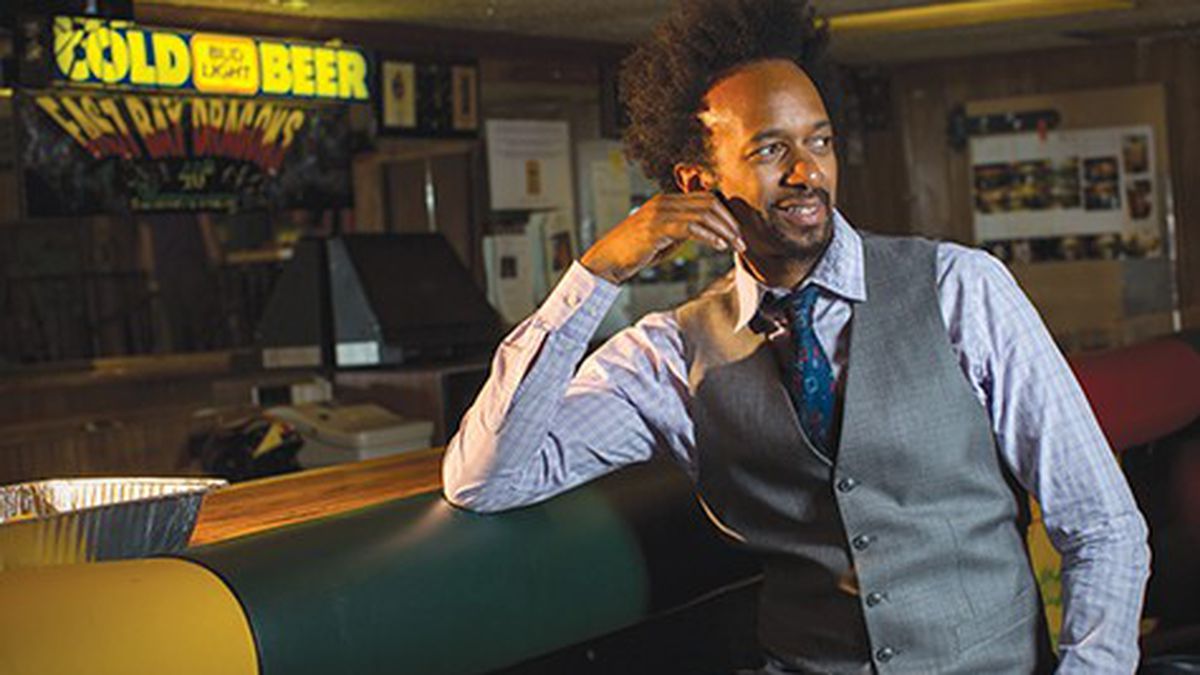The pavement pulsed with heavy drum beats during Fantastic Negrito’s free concert on the corner of Telegraph and West Grand Avenues during June’s First Friday street fair. The show was a celebration of The Last Days of Oakland, Negrito’s first full-length album. Released earlier this month, it’s an urgent, political record that grapples with the many changes Oakland has seen in recent years. The sun set behind the roots rocker as he sang, and the crowd chanted along: “Take that bullshit and turn it into good shit.”
Fantastic Negrito’s rise to national fame over the past two years has been nearly meteoric. Hailed by mainstream music media as a key roots rock revivalist, he’s performed at prominent festivals such as South by Southwest; won NPR’s popular Tiny Desk Concert contest; and appeared on the Fox series Empire. And even though he could have easily packed a major concert hall for the release event, Fantastic Negrito (Xavier Dphrepaulezz) decided to do a free show as a way of paying homage to his humble beginnings.
“I started off with the Fantastic Negrito project actually busking just a few blocks away from that [show’s] location,” he said during a recent interview as he gazed out onto the bay from a sunny bench in Jack London Square. Dphrepaulezz, an Oakland native, has come a long way since those days, and now, he wants to leverage his popularity to draw the public’s attention to pressing social issues such as gentrification, poverty, police brutality, and gun violence.
The Last Days of Oakland reflects the artist’s frustration with today’s sociopolitical climate. He juxtaposes his energetic, upbeat blues rock with heavy, narrative-driven lyrics.
Dphrepaulezz said he sees these ongoing struggles as part of a paradigm shift, leading to the end of the Oakland he grew up in. “I’m old enough to where I grew up in the real, the old Oakland, which was the bastion of counterculture that produced the Free Speech Movement, the East Bay Dragons, edgy people like the Hell’s Angels.”
He also cited Too $hort, E-40, Green Day, Creedence Clearwater Revival, and Carlos Santana as examples of Bay Area artists that emerged during an era of originality. “People sacrificed their blood, sweat, and tears to create this amazing vibration here you can feel.”
But as gentrification advances, Dphrepaulezz fears that the ongoing demographic shifts in the East Bay threaten to make Oakland less of a radical cultural hub. “We should be very careful about what type of society we’re trying to create. If it ends up just being a bunch of elitists, it ain’t gonna be the cool Oakland we love. That vibration is gonna die.”
The Last Days of Oakland meditates on this shift. Dphrepaulezz attributes the decline of Oakland culture to different forms of systematic inequality, especially the displacement of communities of color amid the housing crisis. “It’s an emotional thing,” Dphrepaulezz said. “People grow up in a place like Oakland or San Francisco, they feel like it’s their home. Then suddenly they can’t afford to live there. And then it’s gone.”
Throughout The Last Days, the singer croons his frustrations through a powerful combination of blues musicality and rock vocal stylization. Dphrepaulezz also noted a hip-hop influence in his approach at producing the album, mentioning his use of looping and sampling throughout.
During his songwriting process, Dphrepaulezz approached locals on the street and asked for their thoughts on current issues, recording their responses on his iPhone and using them as samples throughout the record. For the album’s interlude track, “What Do You Do,” he asked people for their thoughts on police brutality and what they do when they get stopped by the police. “First, keep your calm,” one man answered. “Like an OG once told me, you’re not bulletproof,” said another.
Dphrepaulezz aimed to get perspectives that represented various issues that uniquely affect the Black community. “This is a suit I can’t take off,” he said, pinching the skin on the back of his hand. “It’s traumatic being an African American.”
Dphrepaulezz sees his music as a form of therapy for both him and his community. He hopes his music will bring people together, spark critical conversations, and create positive change. He believes that solidarity among the people is the first step towards a better future for the new Oakland.
“I’m very optimistic and hopeful about what we can create in the new Oakland. It’s the end of one thing and the beginning of something else.”














